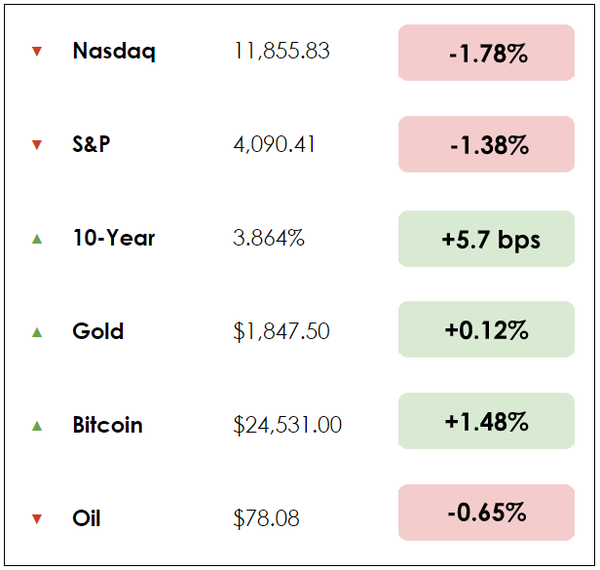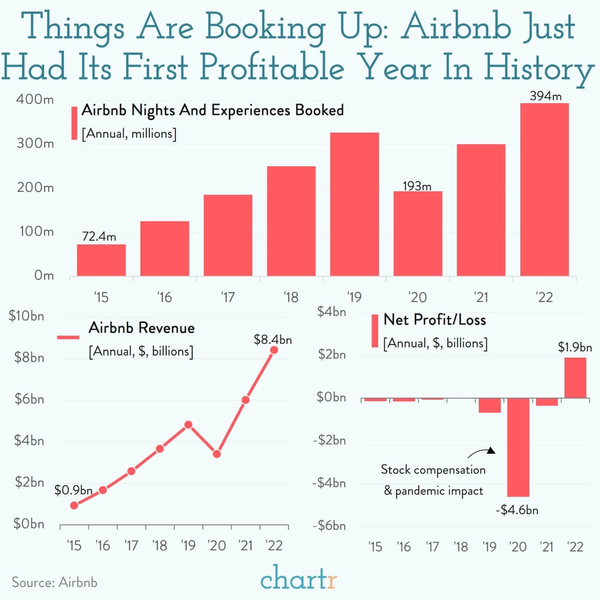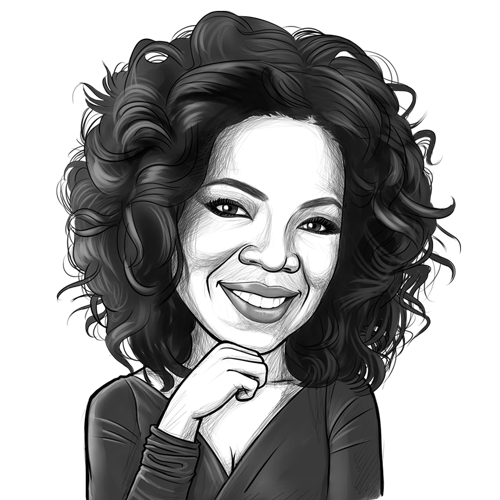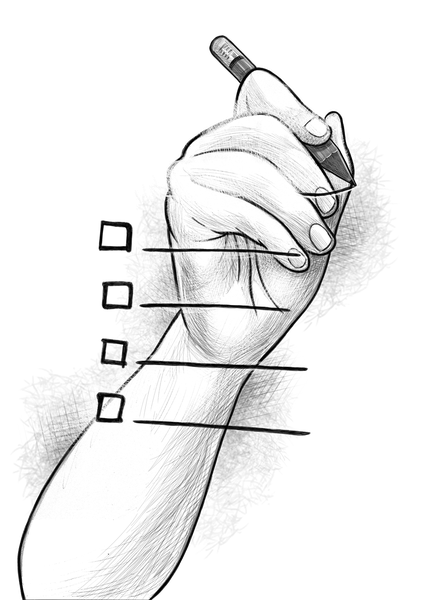Oprah’s World
16 February 2023

Hi, The Investor’s Podcast Network Community!
Fun fact: One million seconds is equal to about 12 days, but one billion seconds is nearly 12 years. One trillion seconds is over 31,000 years.
We throw these big numbers around a lot, but it can be difficult to truly grasp them. On that note, the Congressional Office recently informed Americans that the national debt will grow by $19 trillion over the next decade 🤯
Not loving this newsletter anymore? Unsubscribe here.
Here’s the market rundown:
MARKETS
*All prices as of market close at 4pm EST
Today, we’ll discuss two items in the news:
- A debt tidal wave comes for bloated businesses
- Roku’s stock has us feeling like it’s 2021 all over again
- Plus, our main story on the business genius of Oprah Winfrey
All this, and more, in just 5 minutes to read.
Get smarter about valuing businesses in just a few minutes each week.
Get the weekly email that makes understanding intrinsic value
easy and enjoyable, for free.
IN THE NEWS
🙏 Companies Turn to Investment Banks for “Liability Management” Help (Bloomberg)
Explained:
- Locked out of debt markets and facing considerably higher borrowing costs, executives at a growing number of troubled companies are backed into a corner by the joint burden of higher interest rates and slower economic growth. Some have moved to suspend dividends; others are selling assets to pay debts.
- There’s a looming “tidal wave” of debt maturity, with $6.3 trillion in high-yield and investment-grade corporate bonds coming due by the end of 2025, according to Bloomberg. And companies are looking for help — Just like your parents have a financial advisor, so do many corporations.
- Investment banks such as Houlihan Lokey and Lazard are seeing a surge in inquiries related to so-called “liability management,” as companies bloated by a decade of “almost free money” look to relieve their accumulated debts. This includes extending debt repayment periods, buying back previously-issued discounted bonds early, and other balance sheet optimizations.
Why it matters:
- One executive at Houlihan remarked, “The four horsemen of the apocalypse have arrived. We have a war, a plague (Covid), increasing regional food scarcity given Black Sea shipping blockages, and high inflation, which can be thought of as a form of financial pestilence. Yet, default rates on non-investment grade (debt) haven’t really moved.”
- That seems set to change after a quarter of companies in the S&P 500 missed earnings estimates while almost 9% of companies in Europe are in financial distress. S&P Global Ratings expects default rates for the riskiest “junk-grade” companies to double by September, with conditions worsening as interest rates stay elevated.
- These aren’t necessarily just poorly run businesses, either. One analyst commented that “(liability management) extends much further…to perfectly healthy companies that need assistance in accessing markets and managing (debt) maturities.”
✨ Roku’s Stock Dazzles Wall Street (WSJ)
Explained:
- 2023’s hot start feels eerily similar to 2021’s euphoria, and Roku (ROKU) is the latest example. The streaming hardware company’s shares are up over 80% year-to-date, jumping 17% today after reporting earnings.
- Beloved by college students nationwide, the company’s low-cost devices can turn any TV into a smart one with streaming capabilities. They also sell ads, either on the Roku Channel or sometimes on streaming services viewed through Roku. Investors were excited to hear the firm is seeing improvements in advertising markets, typically one of the first expenses cut in an economic slowdown.
- Roku reported $867.1 million in revenue, but its earnings swung negative, losing $237.2 million compared to its profit of $23.7 million a year earlier. This profitability hit came from a 68% increase in operating expenses. However, Wall Street was delighted to hear that they’re focused on cutting costs, laying off 200 workers at the end of last year.
Why it matters:
- As many Americans’ go-to streaming hub, the company’s President of its media business said, “There’s an emerging appreciation that Roku isn’t just another player in the streaming wars, but that the streaming wars are actually being fought on the Roku platform.” Regardless of who emerges victorious from the cut-throat fight between Disney, Netflix, Apple, Peacock, Paramount, HBO, etc., over eyeballs, as the enabler of streaming services, Roku stands to benefit from increases in streaming generally.
- “Platform revenue,” which includes revenue from advertisers and content publishers for ads viewed and subscriptions purchased on Roku devices, grew 71% in 2020 and another 80% in 2021. Like many other tech companies, Roku experienced incredible growth during the pandemic, only to see business and stock prices return to Earth in 2022.
- But it still grew platform revenue by 20% last year. After shares corrected for its relative growth slowdown, Roku, like several other pandemic darlings, is being rewarded for its resiliency.
*Note: February is Black History Month. Throughout the month, we pay tribute to several African-American investors and philanthropists. You can read our deep dive on Michael Jordan and Jay-Z. Next up: Oprah Winfrey.
Before she became the star of daytime TV, Oprah Winfrey was fired from her job as an evening news reporter at Baltimore’s WJZ-TV because she was “unfit for television news” and couldn’t sever her emotions from her stories.
She was given a daytime TV show as a consolation and found her true calling.
It launched her extraordinary career as a media personality and inspiration to many worldwide.
“Challenges are gifts that force us to search for a new center of gravity,” Oprah has said. Focus on serving others Today, Oprah, 69, is worth nearly $3 billion as a multimedia executive, actress, writer, producer, and philanthropist.
The billionaire is the richest self-made woman in America. Growing up in Milwaukee and Nashville, she fell in love with reading and became a star student who won a full scholarship to Tennessee State University.
She started her career as a TV anchor, and viewers appreciated her natural rapport with guests who felt comfortable telling her their personal stories.
By 32, Oprah became the first African American nationally syndicated television host. That same year, she was nominated for an Academy Award for Best Supporting Actress for her role in the film The Color Purple. She also launched the television production company Harpo Inc., making her the first Black person and the third woman to control her own major studio.
“When you undervalue what you do, the world will undervalue who you are,” Oprah has said. “Doing the best at this moment puts you in the best place for the next moment.”
In 1998, Oprah co-founded Oxygen Media, a programming company geared toward women. She also laid the foundation for the 2000 publication of O, The Oprah Magazine, she co-authored multiple books on diet and exercise, and she launched her influential Book Club in 1996.
In 2002, she made TIME magazine’s Top 100 list of influential people for the year for the first time.
Oprah also is a major philanthropist in the United States and abroad, particularly in South Africa, where she has championed girls’ education. She has donated more than $400 million to higher education, including 400 scholarships at Morehouse College in Atlanta, Georgia.
Here’s Oprah on the value of service, regardless of one’s career field or passions:
“What I know for sure is that if you want to have success, you can’t make success your goal…the key is not to worry about being successful but to instead work toward being significant—and the success will naturally follow. How can you serve your way to greatness? When you shift your focus from success to service, your work as a teacher, clerk, doctor, or dot-comer will instantly have more meaning.”
Oprah by the numbers Before the Oprah Winfrey Show ended in 2011, Oprah’s salary was reported to be about $350 million per year, the highest amount any talk-show host was paid. It aired in more than 100 countries.
Get this: Before her magazine ceased print, it sold about 2 million copies per issue. The magazine is available on the digital platform as Oprah Daily, which still has more than 10 million readers per issue.
That’s not all. Today, Oprah runs a large podcast. She also works with Apple TV+ for The Oprah Conversation, which has featured several high-end celebrities. Guests include Elliot Page, Stevie Wonder, Mariah Carey, and Barack Obama.
But Oprah’s most popular show was a sit down with Prince Harry and Meghan Markle. CBS reportedly paid her around $7 to 9 million to air that episode alone.
Life lessons
- Your past doesn’t define you: Oprah moved around as a child and grew up poor, but she channeled her love and creativity into something meaningful.
- Education is key: Oprah has always been an avid reader constantly looking to learn and relate to others.
- Take calculated risks: Oprah has launched a variety of ventures and bet on herself over and over.
- Be authentic: While TV is ripe with fluffy shows and gossip to fill air time, Oprah wanted to be contrarian. “My calling became to create shows that encourage and inspire as much as they entertain,” she has said. “Television that leaves guests with their dignity and helps us all see our lives in a different way.”
Dive deeper You can read Oprah’s 2021 bestseller and visit her site for more information. Her podcast is called Oprah’s Super Soul.
SEE YOU NEXT TIME!
That’s it for today on We Study Markets!
See you later!
If you enjoyed the newsletter, keep an eye on your inbox for them on weekdays around 6pm EST, and if you have any feedback or topics you’d like us to discuss, simply respond to this email.












